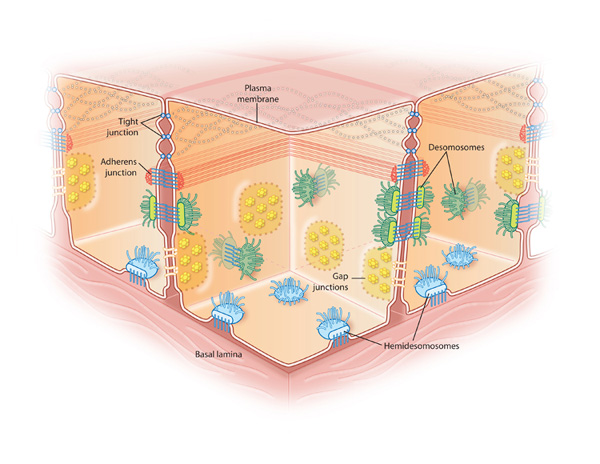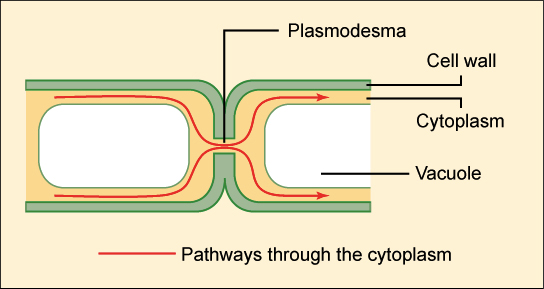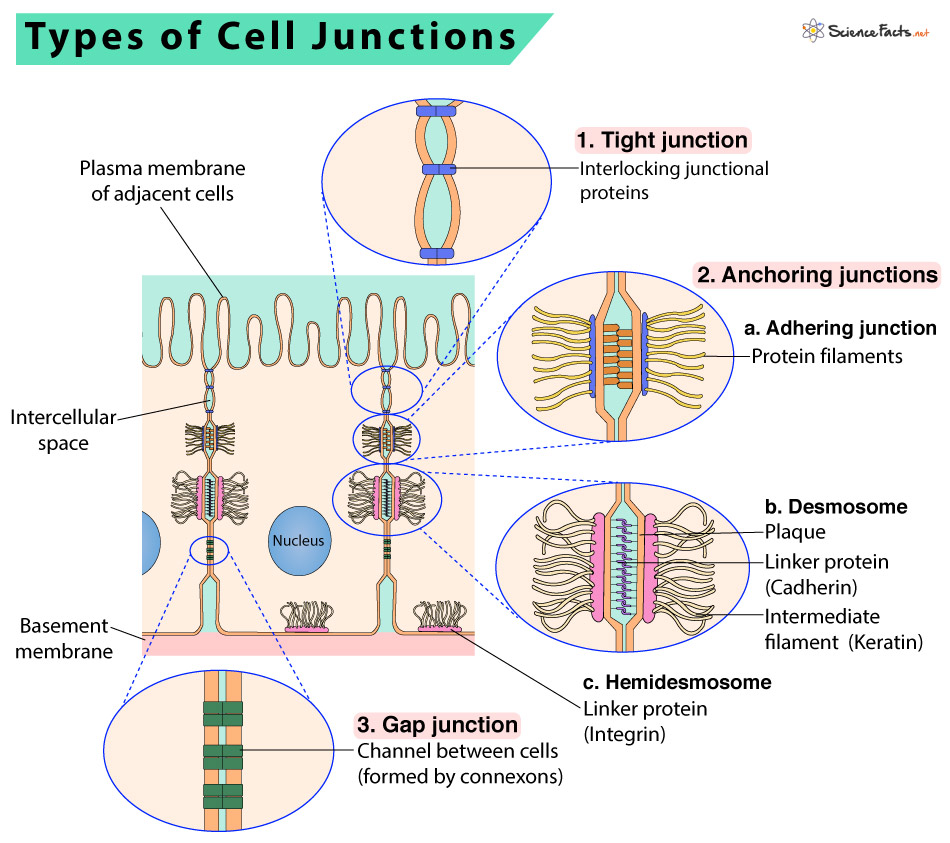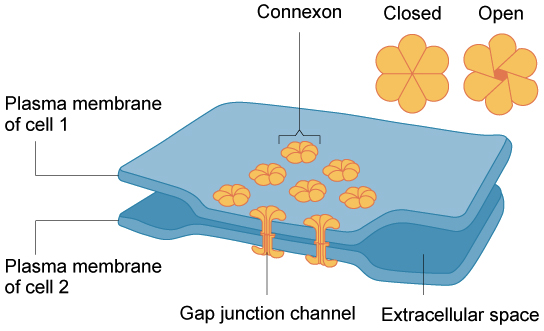Your Which cell junction is unique to animals images are ready. Which cell junction is unique to animals are a topic that is being searched for and liked by netizens today. You can Find and Download the Which cell junction is unique to animals files here. Download all royalty-free images.
If you’re searching for which cell junction is unique to animals images information related to the which cell junction is unique to animals interest, you have pay a visit to the right blog. Our website always gives you hints for viewing the highest quality video and picture content, please kindly hunt and find more enlightening video articles and images that match your interests.
Which Cell Junction Is Unique To Animals. In vertebrates gap junctions develop when a set of six. They are channels between neighboring cells that allow for the transport of ions water and other substances 3. Structurally however gap junctions and plasmodesmata are quite different. These data contribute to an increasingly complex narrative about the ancestral diversity and organization of.
 Cell Junctions Anchoring Types Of Cell Junctions In Plants Plasmodesmata In Animals Ecm Extra Cellular Matrix Tight Junctions Anchoring Junctions Ppt Download From slideplayer.com
Cell Junctions Anchoring Types Of Cell Junctions In Plants Plasmodesmata In Animals Ecm Extra Cellular Matrix Tight Junctions Anchoring Junctions Ppt Download From slideplayer.com
Jacob Musser Leslie Pan Fabian Rupert and Sebastian SchnorrenbergEMBL. 16 Multiple Choice eBook References gap O O O tight desmosomes All are unique to animals. They are channels between neighboring cells that allow for the transport of ions water and other substances 3. The integrity and organization of animal tissues depend upon specialized protein complexes that mediate adhesion between cells with each other cadherin-based adherens junctions and with the extracellular matrix integrin-based focal adhesions. Adjacent cells are held together by thin linker protein filaments that extend from the plaques and fit together like the teeth of a zipper in the intercellular space. Which cell junction is unique to animals.
Plasmodesmata are junctions between plant cells whereas animal cell contacts include tight junctions gap junctions and desmosomes.
Cell junction molecules There are four main types. The integrity and organization of animal tissues depend upon specialized protein complexes that mediate adhesion between cells with each other cadherin-based adherens junctions and with the extracellular matrix integrin-based focal adhesions. Muelleri has specialized junctions not found in other animals. Also know what are the 4 types of cell junctions. Gap junctions are composed of transmembrane proteins called connexins. Reconstructing how and when these cell junctions evolved is central to understanding early tissue evolution in animals.
 Source: slideplayer.com
Source: slideplayer.com
Structurally however gap junctions and plasmodesmata are quite different. Including cellspicule junctions and cellbacteria junctions. Sponges barely qualify as animals. On the cytoplasmic face of each plasma membrane is a thickening called a plaque. Both cell types contain 80S ribosomes for protein synthesis.
 Source: nature.com
Source: nature.com
Cell Junctions anchoring Types of Cell Junctions In plants. Which cell junction is unique to animals. Including cellspicule junctions and cellbacteria junctions. Structurally however gap junctions and plasmodesmata are quite different. Plant cells exhibit a fixed rectangular shape due to the presence of a cell wall.
 Source: researchgate.net
Source: researchgate.net
Plant cells exhibit a fixed rectangular shape due to the presence of a cell wall. Structurally however gap junctions and plasmodesmata are quite different. Plant cells exhibit a fixed rectangular shape due to the presence of a cell wall. Structurally however gap junctions and plasmodesmata are quite different. Functionally gap junctions in animal cells are a lot like plasmodesmata in plant cells.
 Source: researchgate.net
Source: researchgate.net
They are channels between neighboring cells that allow for the transport of ions water and other substances. Jacob Musser Leslie Pan Fabian Rupert and Sebastian SchnorrenbergEMBL. Abstract The integrity and organization of animal tissues depend upon specialized protein complexes that mediate adhesion between cells with each other cadherin-based adherens junctions and with the extracellular matrix integrin-based focal. Sponges barely qualify as animals. Gap junctions Functionally gap junctions in animal cells are a lot like plasmodesmata in plant cells.
 Source: pinterest.com
Source: pinterest.com
A gap junction is a second type of cell junction in epithelial cells as well as other tissues including muscle. They are channels between neighboring cells that allow for the transport of ions water and other substances 3. Both cell types contain 80S ribosomes for protein synthesis. Selectins cadherins integrins and the immunoglobulin superfamily. Which cell junction is unique to animals.
 Source: khanacademy.org
Source: khanacademy.org
Sponges barely qualify as animals. Deep in a sponges pores are chambers lined with digestive cells pink newly found to activate a gene purple that in other organisms is active in nerve cells. Reconstructing how and when these cell junctions evolved is central to understanding early tissue evolution in animals. Adjacent cells are held together by thin linker protein filaments that extend from the plaques and fit together like the teeth of a zipper in the intercellular space. They are channels between neighboring cells that allow for the transport of ions water and other substances 3.
 Source: sciencefacts.net
Source: sciencefacts.net
Gap tight desmosomes all are unique to animals. They are channels between neighboring cells that allow for the transport of ions water and other substances 3. A gap junction is a second type of cell junction in epithelial cells as well as other tissues including muscle. Functionally gap junctions in animal cells are a lot like plasmodesmata in plant cells. Plant cells exhibit a fixed rectangular shape due to the presence of a cell wall.
 Source: courses.lumenlearning.com
Source: courses.lumenlearning.com
Reconstructing how and when these cell junctions evolved is central to understanding early tissue evolution in animals. This is in stark contrast to the neuron in the human body which is just 100 microns across. ECM Extra-cellular Matrix- Tight Junctions Anchoring Junctions Gap Junctions Extracellular Matrix Sticky layer of glycoprotein holding cells together The extracellular matrix ECM is the largest component of normal skin and gives the skin its unique properties of elasticity tensile strength and. Plasmodesmata are junctions between plant cells whereas animal cell contacts include tight junctions gap junctions and desmosomes. Gap junctions Functionally gap junctions in animal cells are a lot like plasmodesmata in plant cells.
 Source: khanacademy.org
Source: khanacademy.org
17 Multiple Choice eBook References an extracellular matrix plasmodesmata gap junctions adhesion junctions desmosomes O tight junctions Which cell junction will allow the. Animal cells range in size from a few microscopic microns to few millimetres. Also know what are the 4 types of cell junctions. On the contrary animal cells have a round irregular shape due to the absence of a cell wall. Due to the geometry of three-cell vertices the sealing of the cells at these sites requires a specific junctional organization different from those in bicellular junctions.
 Source: slideplayer.com
Source: slideplayer.com
Functionally gap junctions in animal cells are a lot like plasmodesmata in plant cells. Reconstructing how and when these cell junctions evolved is central to understanding early tissue evolution in animals. Cell Junctions anchoring Types of Cell Junctions In plants. Also know what are the 4 types of cell junctions. A gap junction is a second type of cell junction in epithelial cells as well as other tissues including muscle.
 Source: slidetodoc.com
Source: slidetodoc.com
The integrity and organization of animal tissues depends upon specialized protein complexes that mediate adhesion between cells with each other cadherin-based adherens junctions and with the extracellular matrix integrin-based focal adhesions. 17 Multiple Choice eBook References an extracellular matrix plasmodesmata gap junctions adhesion junctions desmosomes O tight junctions Which cell junction will allow the. In vertebrates gap junctions develop when a set of six. They are channels between neighboring cells that allow for the transport of ions water and other substances 3. Reconstructing how and when these cell junctions evolved is central to understanding early tissue evolution in animals.
 Source: pinterest.com
Source: pinterest.com
In vertebrates components tricellular junctions are tricellulin and lipolysis-stimulated lipoprotein receptors. 17 Multiple Choice eBook References an extracellular matrix plasmodesmata gap junctions adhesion junctions desmosomes O tight junctions Which cell junction will allow the. Which cell junction is unique to animals. Adjacent cells are held together by thin linker protein filaments that extend from the plaques and fit together like the teeth of a zipper in the intercellular space. Due to the geometry of three-cell vertices the sealing of the cells at these sites requires a specific junctional organization different from those in bicellular junctions.
 Source: biologydictionary.net
Source: biologydictionary.net
Including cellspicule junctions and cellbacteria junctions. On the contrary animal cells have a round irregular shape due to the absence of a cell wall. The integrity and organization of animal tissues depend upon specialized protein complexes that mediate adhesion between cells with each other cadherin-based adherens junctions and with the extracellular matrix integrin-based focal adhesions. They are channels between neighboring cells that allow for the transport of ions water and other substances 3. Deep in a sponges pores are chambers lined with digestive cells pink newly found to activate a gene purple that in other organisms is active in nerve cells.

Cell junction molecules There are four main types. Cell Junctions anchoring Types of Cell Junctions In plants. Reconstructing how and when these cell junctions evolved is central to understanding early tissue evolution in animals. These data contribute to an increasingly complex narrative about the ancestral diversity and organization of. ECM Extra-cellular Matrix- Tight Junctions Anchoring Junctions Gap Junctions Extracellular Matrix Sticky layer of glycoprotein holding cells together The extracellular matrix ECM is the largest component of normal skin and gives the skin its unique properties of elasticity tensile strength and.

Functionally gap junctions in animal cells are a lot like plasmodesmata in plant cells. Functionally gap junctions in animal cells are a lot like plasmodesmata in plant cells. They are channels between neighboring cells that allow for the transport of ions water and other substances 3. Both cell types contain 80S ribosomes for protein synthesis. Structurally however gap junctions and plasmodesmata are quite different.
 Source: cliffsnotes.com
Source: cliffsnotes.com
16 Multiple Choice eBook References gap O O O tight desmosomes All are unique to animals. Structurally however gap junctions and plasmodesmata are quite different. Plant cells exhibit a fixed rectangular shape due to the presence of a cell wall. Adjacent cells are held together by thin linker protein filaments that extend from the plaques and fit together like the teeth of a zipper in the intercellular space. Due to the geometry of three-cell vertices the sealing of the cells at these sites requires a specific junctional organization different from those in bicellular junctions.

Gap junctions Functionally gap junctions in animal cells are a lot like plasmodesmata in plant cells. In vertebrates components tricellular junctions are tricellulin and lipolysis-stimulated lipoprotein receptors. What cell junction is unique to animals. The integrity and organization of animal tissues depends upon specialized protein complexes that mediate adhesion between cells with each other cadherin-based adherens junctions and with the extracellular matrix integrin-based focal adhesions. The largest known animal cell is the ostrich egg which can stretch over 51 inches across and weighs about 14 kilograms.
 Source: open.edu
Source: open.edu
Desmosomes are anchoring junctions mechanical couplings scattered like rivets along the sides of adjacent cells to prevent their separation. They are channels between neighboring cells that allow for the transport of ions water and other substances 3. In vertebrates components tricellular junctions are tricellulin and lipolysis-stimulated lipoprotein receptors. What are the 3 cell junctions. Reconstructing how and when these cell junctions evolved is central to understanding early tissue evolution in animals.
This site is an open community for users to do sharing their favorite wallpapers on the internet, all images or pictures in this website are for personal wallpaper use only, it is stricly prohibited to use this wallpaper for commercial purposes, if you are the author and find this image is shared without your permission, please kindly raise a DMCA report to Us.
If you find this site adventageous, please support us by sharing this posts to your preference social media accounts like Facebook, Instagram and so on or you can also bookmark this blog page with the title which cell junction is unique to animals by using Ctrl + D for devices a laptop with a Windows operating system or Command + D for laptops with an Apple operating system. If you use a smartphone, you can also use the drawer menu of the browser you are using. Whether it’s a Windows, Mac, iOS or Android operating system, you will still be able to bookmark this website.






